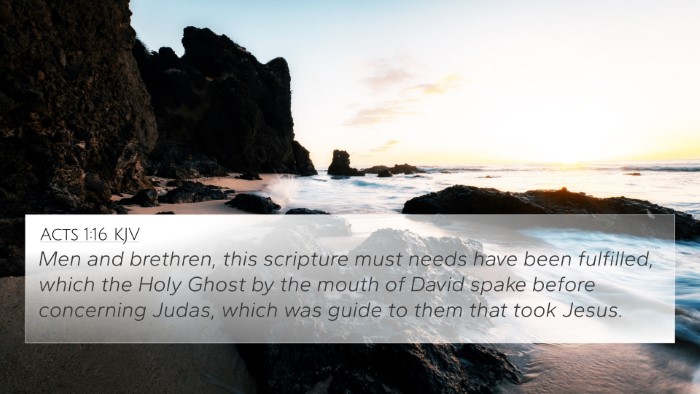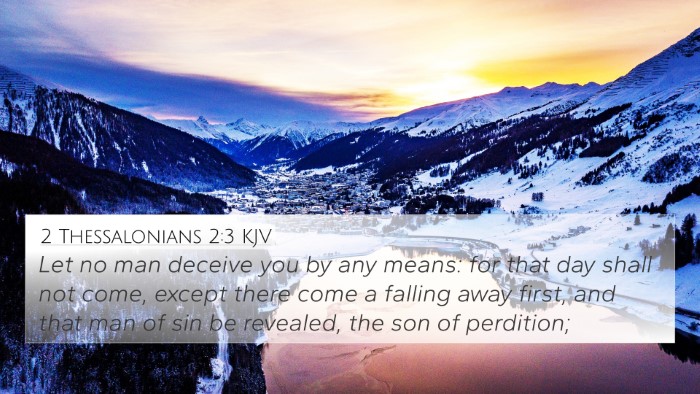Old Testament
Genesis Exodus Leviticus Numbers Deuteronomy Joshua Judges Ruth 1 Samuel 2 Samuel 1 Kings 2 Kings 1 Chronicles 2 Chronicles Ezra Nehemiah Esther Job Psalms Proverbs Ecclesiastes Song of Solomon Isaiah Jeremiah Lamentations Ezekiel Daniel Hosea Joel Amos Obadiah Jonah Micah Nahum Habakkuk Zephaniah Haggai Zechariah MalachiJohn 17:12 Similar Verses
John 17:12 Cross References
While I was with them in the world, I kept them in thy name: those that thou gavest me I have kept, and none of them is lost, but the son of perdition; that the scripture might be fulfilled.
Uncover the Rich Themes and Topics of This Bible Verse
Listed below are the Bible themes associated with John 17:12. We invite you to explore each theme to gain deeper insights into the Scriptures.
John 17:12 Cross Reference Verses
This section features a detailed cross-reference designed to enrich your understanding of the Scriptures. Below, you will find carefully selected verses that echo the themes and teachings related to John 17:12 KJV. Click on any image to explore detailed analyses of related Bible verses and uncover deeper theological insights.

John 18:9 (KJV) »
That the saying might be fulfilled, which he spake, Of them which thou gavest me have I lost none.

John 6:37 (KJV) »
All that the Father giveth me shall come to me; and him that cometh to me I will in no wise cast out.

John 13:18 (KJV) »
I speak not of you all: I know whom I have chosen: but that the scripture may be fulfilled, He that eateth bread with me hath lifted up his heel against me.

John 6:39 (KJV) »
And this is the Father's will which hath sent me, that of all which he hath given me I should lose nothing, but should raise it up again at the last day.

Acts 1:16 (KJV) »
Men and brethren, this scripture must needs have been fulfilled, which the Holy Ghost by the mouth of David spake before concerning Judas, which was guide to them that took Jesus.

1 John 2:19 (KJV) »
They went out from us, but they were not of us; for if they had been of us, they would no doubt have continued with us: but they went out, that they might be made manifest that they were not all of us.

2 Thessalonians 2:3 (KJV) »
Let no man deceive you by any means: for that day shall not come, except there come a falling away first, and that man of sin be revealed, the son of perdition;

Acts 1:25 (KJV) »
That he may take part of this ministry and apostleship, from which Judas by transgression fell, that he might go to his own place.

Hebrews 2:13 (KJV) »
And again, I will put my trust in him. And again, Behold I and the children which God hath given me.

Luke 4:26 (KJV) »
But unto none of them was Elias sent, save unto Sarepta, a city of Sidon, unto a woman that was a widow.
John 17:12 Verse Analysis and Similar Verses
Bible Verse Interpretation: John 17:12
John 17:12 is a poignant passage in the New Testament where Jesus speaks about the preservation of His disciples. The verse reads:
"While I was with them, I kept them in Thy name. Those whom Thou gavest Me I have kept, and none of them is lost, but the son of perdition; that the scripture might be fulfilled."
Contextual Analysis
This verse is situated in a larger prayer of Jesus, often referred to as the High Priestly Prayer, where He intercedes for His disciples and the future believers.
Key Themes
- Protection of the Disciples: Jesus emphasizes His role as a protector during His earthly ministry.
- Fulfillment of Scripture: The mention of the "son of perdition" refers specifically to Judas Iscariot, illustrating the necessity of his betrayal within the divine plan.
- Divine Sovereignty: This verse underscores the belief that God is in control of all events, even those that lead to sorrow.
Insights from Public Domain Commentaries
Matthew Henry's Commentary
Henry highlights that in this verse, Jesus assures that He safeguarded His followers spiritually and physically. His poignant mention of Judas is a reminder of the tragic reality of loss in His ministry. The phrase "none of them is lost" serves to indicate the assurance of eternal life for believers and reinforces the notion that God honors His promises in preserving those who belong to Him.
Albert Barnes' Commentary
Barnes notes that this assertion by Jesus portrays Him as a faithful shepherd who actively guards His flock. He elaborates on the identity of the "son of perdition" as Judas, noting this includes a prophetic dimension denoting betrayal and the unfolding of God's plan through human actions. Barnes emphasizes the significance of believers being kept by the power of Christ and the importance of divine support.
Adam Clarke's Commentary
Clarke points out that the security of the apostles under Jesus' care speaks to the broader doctrine of safeguarding believers. He emphasizes the contrast illustrated by Judas’ fate and praises the idea that Jesus affirms His commitment to His followers. Clarke also engages with the theological implications of this passage, reaffirming faith in Christ's protective nature.
Cross-References with Other Bible Verses
To understand the interconnectedness of scripture, the following verses echo themes found in John 17:12:
- John 10:28-29: "And I give unto them eternal life; and they shall never perish, neither shall any man pluck them out of my hand." This verse reinforces Jesus’ protective role over His followers.
- Romans 8:38-39: "For I am persuaded, that neither death, nor life, nor angels, nor principalities, nor powers, nor things present, nor things to come, shall be able to separate us from the love of God." It confirms the unyielding love and protection of God over believers.
- Matthew 23:37: "O Jerusalem, Jerusalem, thou that killest the prophets, and stonest them which are sent unto thee, how often would I have gathered thy children together." This reflects Jesus’ desire to protect His own.
- Hebrews 7:25: "Wherefore he is able also to save them to the uttermost that come unto God by him, seeing he ever liveth to make intercession for them." This affirms Jesus’ ongoing intercessory role.
- Luke 22:31-32: "And the Lord said, Simon, Simon, behold, Satan hath desired to have you, that he may sift you as wheat: But I have prayed for thee, that thy faith fail not." This passage highlights Jesus’ protective prayers for His disciples.
- Philippians 1:6: "Being confident of this very thing, that he which hath begun a good work in you will perform it until the day of Jesus Christ." Assurance of faith preservation extends beyond earthly life.
- 2 Thessalonians 3:3: "But the Lord is faithful, who shall establish you, and keep you from evil." God's faithfulness to protect is reiterated here.
Inter-Biblical Dialogue
John 17:12 engages in a dialogue with various scriptures throughout the Bible, forming a network of thematic connections. Understanding these relational aspects enhances the overall comprehension of the text:
- The call to faithfulness aligns with the warnings against falling away, as seen in Hebrews 3:12-14.
- The concept of the “son of perdition” links back to the Old Testament themes of treachery and fate, such as Psalms 41:9, which foreshadows betrayal.
- Jesus' role as a protector connects towards the eschatological promises illustrated in Revelation 7:17, where the Lamb serves as the shepherd of the redeemed.
Conclusion
The verse John 17:12 conveys profound truths about Christ's role in guarding and preserving His followers against spiritual loss, representing God's eternal care and purpose in protectively guiding believers. Engaging with public domain commentaries and understanding inter-Biblical dialogues showcases the richness of biblical teachings and encourages believers to delve deeper into the thematic connections that foster a more robust faith.





